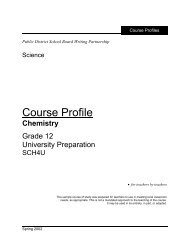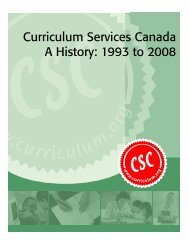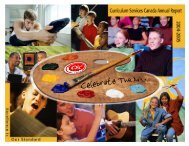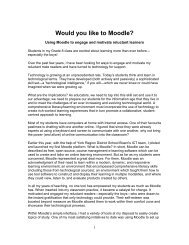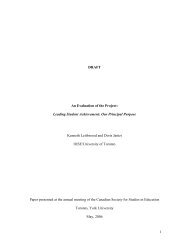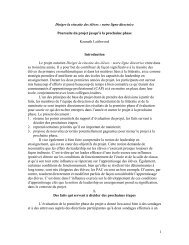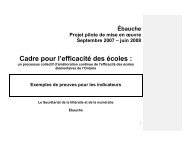Course Profile - Curriculum Services Canada
Course Profile - Curriculum Services Canada
Course Profile - Curriculum Services Canada
You also want an ePaper? Increase the reach of your titles
YUMPU automatically turns print PDFs into web optimized ePapers that Google loves.
Teaching/Learning Strategies<br />
• The teacher and students agree upon the scenes to be performed.<br />
• Outline the expectations of the assignment as follows:<br />
• Students carefully read through and study their scene.<br />
• Students decide how they want to stage their scene. As an option the students draw the stage set.<br />
• Students make a copy of the scene, if needed, so that they can make the necessary changes right<br />
on the script.<br />
• Students make production notes for the way they want to stage the scene. Production notes would<br />
include pauses, tone of voice, gestures, and facial expressions, notes or diagrams of action and<br />
movement.<br />
• Students decide on how to costume their players. Again as an option, students provide a drawing<br />
or description of the costumes, as well as a justification for selecting that particular costume.<br />
• Students keep a response journal, outlining their thoughts and feelings as they work through the<br />
process.<br />
• Encourage students to practise with cue cards. Lead students through some simple relaxation<br />
exercises in order to help them deliver their optimal performance, as found in a text such as<br />
Dramathemes: A Practical Guide for Teaching Drama, (see Resources).<br />
Assessment/Evaluation<br />
Formative Assessment:<br />
• Reader response journals for completion and thoroughness of reflection (see Appendix 2.1)<br />
• Informal and formal observation of group process for co-operation and attention to task<br />
• Rehearsal process via a participation checklist<br />
Summative Assessment:<br />
• Student performance of scene via a rubric (see Appendix 4.1)<br />
Accommodations<br />
• Videotape the scene for students who prefer not to do a live performance or as an added challenge<br />
for those who would like to enhance their performance with editing and/or special effects.<br />
• Use cue cards for the final performance for those students who are unable to memorize lines.<br />
• Assign backstage duties to students who are unable to perform.<br />
Resources<br />
A drama text<br />
Swartz. Dramathemes: A Practical Guide for Teaching Drama.<br />
Kemp, D. A Different Drama.<br />
Booth, D. Improvisation and Interpretation.<br />
Beissel. Cues and Entrances.<br />
Video and audio cassette versions of the plays<br />
Unit 4 - Page 11<br />
•English - Academic



